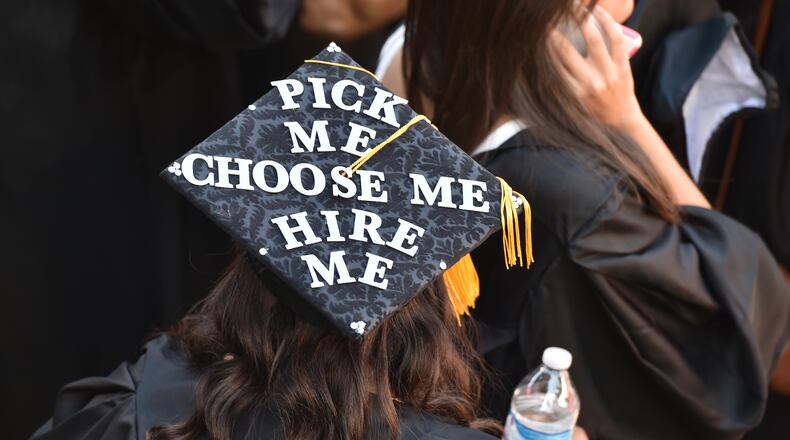Labor economist Anthony Carnevale stepped outside the lexicon of science to summarize the dizzying expansion of education and training credentials, including industry certificates, diplomas, apprenticeships, degrees, certifications, licenses and digital badges. “We have credentialed the bejesus out of our economy,” he said.
Americans earned 738,428 education credentials of some sort in 2018. Among them were 370,020 credentials from education institutions, 315,067 from non-academic organizations and 7,132 from massive open online courses or MOOCs, according to Scott Cheney, founding chief executive officer of Credential Engine, a nonprofit seeking to create credential transparency.
There is no standard or easily accessible way to weight the value and integrity of all these credentials and whether they pay off, according to experts at the Education Writers Association’s recent seminar, “Pathways to Good Jobs — Higher Ed’s Changing Role in Upward Mobility.”
Cheney defines credentials as “everything that an individual is trying to use to convey their knowledge, skills and abilities, their capabilities in the marketplace.” A new report Credential Engine will release in February will show there are nearly a million unique credentials in this country for which Americans spent more than $1.9 trillion to obtain.
“Not all credentials are created equally,” said Amy Loyd, Jobs for the Future vice president of programs. Her organization is working to identify high-value credentials and quality training programs and connect displaced and underemployed workers with them.
What you choose to study matters, as does the institution issuing the credential, said Loyd. Geography is also a factor. “Even looking at something like nursing degrees from three different institutions in three different states led to first-year earnings that ranged from $26,000 to $61,000,” she said.
“It is extremely difficult for employers to sort through thousands and thousands of different credentials,” said economist Byron Auguste, president and co-founder of the nonprofit group Opportunity@Work. “They come from all different sources. And some of those credentials have local value. But there are only a handful, maybe 30, that really have consistent market value.”
Employers have pushed more and more workers to seek academic credentials because of their hiring practices, said Auguste. “As a matter of convenience, employers have chosen to have one very predominant method of screening: Do you have a bachelor’s degree?” said Auguste, who served for two years in the Obama White House as deputy assistant to the president for economic policy and deputy director of the National Economic Council.
The upward mobility once possible for workers who learned their skills on the job is becoming limited to those educated in a college classroom, said Auguste. A generic bachelor’s degree requirement is routinely applied to jobs that people are doing very well without degrees, he said.
For example, Auguste said 75% of job listings today for administrative assistants insist on a bachelor’s degree. Yet, only a third of the people in those jobs now hold a degree. “So, two-thirds of administrative assistants today can’t apply for three-quarters of the jobs in their field,” he said.
Why do employers do this? “The answer is because it is easy,” said Carnevale, director of the Georgetown University Center on Education and the Workforce.
Faced with increased competition from Japan and Germany in manufacturing in the early 1980s, American companies looked at their production line workers, most of whom had only attended high school, and didn’t see the agility and flexibility demanded in automation and innovation. “They were looking for a new set of skills, and they simply began to hire people who had more education than high school,” said Carnevale.
“Employers say they want skills, but they hire for degrees,” said Auguste. Now, regardless of a worker’s skills, he said, “If you don’t have this expensive-to-get college credential that you typically get in privileged settings, employers will not consider you for a career path job where they will invest behind you.” That is a system that is going to create tremendous inequality, said Auguste.
And it has, according to Carnevale. Lower-income children with high test scores have a 30% chance of making it through a four-year college and into a good job by age 28, he said. Comparatively, low-scoring students from high-income households have a 70% chance of ending up with good job by age 28.
“This is a solvable problem,” said Auguste. “Employers need to stop requiring a generic bachelor’s degree as a prerequisite to the job.”
Consider that most small businesses lack IT departments, but someone is doing that job, perhaps a receptionist or an office manager, said Auguste. Yet, if that person tried to take those skills and apply for a first-rung IT job, their lack of degree would shut them out of consideration, he said.
“Call it pedigree bias,” said Auguste. “There is a lot higher education needs to do, but it absolutely cannot do it without a change in how employer demand is signaled.”
Employers used to expect workers to come out of school training-ready with general skills. The workplace itself provided the specific training for the job. Now, Carnevale said, “Industry is aggressively demanding that the education system provide people with these skills on day one. We are relying on education to do the job.”
About the Author

